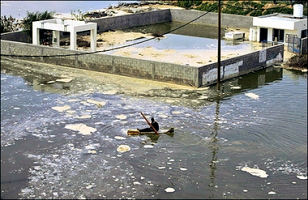 Bush, AIPAC and Palestine
Bush, AIPAC and Palestine
The Political Economy of a Disaster
By James Petras
April 2nd, 2007
On Monday, March 26, 2007 in Northern Gaza a river of raw sewage and debris overflowed from a collapsed earth embankment into a refugee camp driving 3,000 Palestinians from their homes. Five residents drowned, 25 were injured and scores of houses were destroyed.
The New York Times, Washington Post and the television media blamed shoddy infrastructure. The Daily Alert (the house organ of the Presidents of the Major American Jewish Organizations) blamed the Palestinians who they claimed were removing sand to sell to construction contractors thus undermining the earth embankment. The disaster at Umm Naser (the village in question) is emblematic of everything that is wrong with US-Israeli politics in the Middle East. The disaster in this isolated village has its roots first and foremost in Washington where AIPAC and its political allies have successfully secured US backing for Israel’s financial and economic boycott of the Palestinian government subsequent to the democratic electoral victory of Hamas.
AIPAC’s victory in Washington reverberated throughout Europe and beyond as the European Union also applied sanctions shutting off financing of all new infrastructure projects and the maintenance of existing facilities. At the AIPAC conventions of 2005 through 2007, the leaders of both major American parties, congressional leaders and the White House pledged to re-enforce AIPAC’s boycott and sanctions strategy. AIPAC celebrated its victory for Israeli policy and claimed authorship of the legislation. In addition to malnutrition, the policy undermined all public maintenance projects.
Equally central to the disaster, Israel’s massive sustained bombing attack on Gaza in the summer of 2006, demolished roads, bridges, sewage treatment facilities, water purification and electrical power plants. Northern Gaza was one of its many targets, putting severe strain on already precarious infrastructure and government budgets ñ including the maintenance of sewage treatment plants and cesspools. (….Full Article Here)



